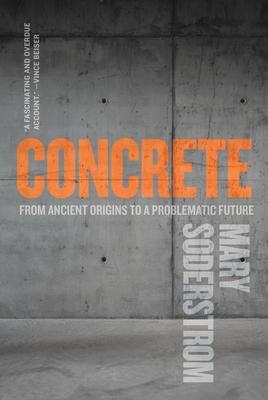A fascinating history of the carbon footprint of our concrete world--from ancient Roman architecture to urban cityscapes--and the trouble it spells for sustainability amidst rapid climate change
For readers of The Sixth Extinction and The Uninhabitable Earth, Concrete explores the history of a material that has been central to architecture and design for thousands of years--and what its future looks like in a world experiencing rapid climate change. Imagine what the world would be like without concrete: there'd be no high-rises, no grand irrigation projects, no lettuce from southern climes in the winter, no multi-lane highways crisscrossing continents, a shortage of electricity, more mud in some places, more solitude in others. But because of the fossil fuels and other resources required to make concrete, there also would be less CO2 in the atmosphere and less dramatic climate change. In Concrete: From Ancient Origins to a Problematic Future, Soderstrom tells the story of concrete's glorious past, extravagant present, and uncertain future with careful research, lively anecdotes, and thoughtful reflection. The framework for this exploration is one the Romans--famous for concrete structures that are still strong--would understand: the four elements of Earth, Fire, Water, and Air.
Book
Concrete: From Ancient Origins to a Problematic Future
(Write a Review)
Paperback
$25.95
A fascinating history of the carbon footprint of our concrete world--from ancient Roman architecture to urban cityscapes--and the trouble it spells for sustainability amidst rapid climate change
For readers of The Sixth Extinction and The Uninhabitable Earth, Concrete explores the history of a material that has been central to architecture and design for thousands of years--and what its future looks like in a world experiencing rapid climate change. Imagine what the world would be like without concrete: there'd be no high-rises, no grand irrigation projects, no lettuce from southern climes in the winter, no multi-lane highways crisscrossing continents, a shortage of electricity, more mud in some places, more solitude in others. But because of the fossil fuels and other resources required to make concrete, there also would be less CO2 in the atmosphere and less dramatic climate change. In Concrete: From Ancient Origins to a Problematic Future, Soderstrom tells the story of concrete's glorious past, extravagant present, and uncertain future with careful research, lively anecdotes, and thoughtful reflection. The framework for this exploration is one the Romans--famous for concrete structures that are still strong--would understand: the four elements of Earth, Fire, Water, and Air.Paperback
$25.95